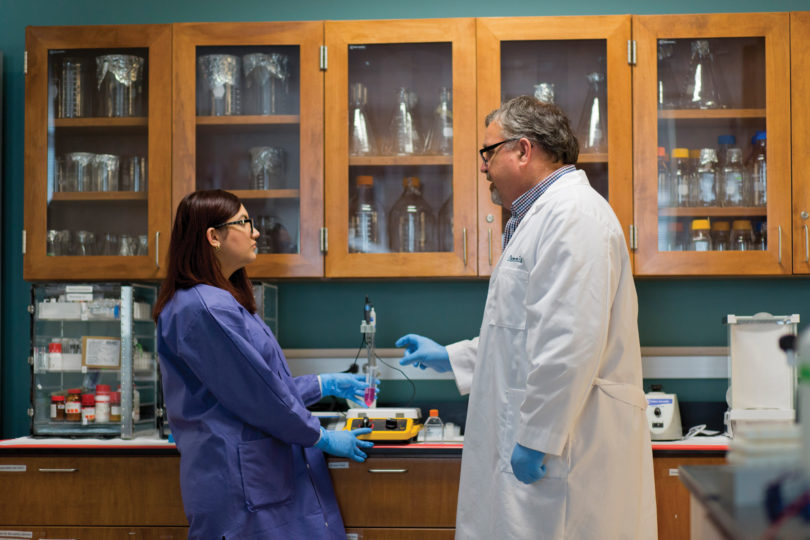UGA researchers battle neglected diseases around the globe
by
A UGA center takes on a public health problem that includes more than a dozen diseases of poverty.
Lymphatic filariasis. Schistosomiasis. Cryptosporidiosis. They’re some of the world’s most widespread parasitic diseases, but many people have never heard of them.
Those who live in Western nations are lucky—these diseases don’t really have to be on their radar. But for more than 2 billion people across the globe, the risk of contracting a disfiguring or potentially deadly parasitic disease is constant.
UGA’s Center for Tropical and Emerging Global Diseases (CTEGD) is aiming to change that.

Founded 20 years ago by Regents Professor of Cellular Biology Rick Tarleton, CTEGD consolidates UGA’s extensive, campus-wide tropical disease knowledge and drug discovery expertise into an interdisciplinary research unit that focuses on finding solutions for parasitic diseases. The center has garnered more than $135 million in research funding, and its 25 faculty, spanning eight departments across four colleges and schools, focus on more than a dozen diseases commonly associated with poverty.
Parasite-caused illnesses ravage developing nations across Africa, Asia, and Latin America, especially in areas already afflicted by inadequate housing, poor sanitation and unsafe water supplies, and stagnant or failing economies. In addition to a significant death toll, neglected disease means billions of dollars in lost productivity—the kind of economic hit that can upheave governments.
“These diseases cause poverty. Poverty breeds unrest. Unrest breeds political difficulties,” says Daniel Colley, professor of microbiology and the center’s former director. “If you can provide people with good health, you can take away a tremendous amount of angst in people’s lives.”
But governments often don’t have the ability or the resources to fix the problem. And, while several pharmaceutical companies donate existing drugs for some neglected diseases, there’s little incentive for pharmaceutical companies to develop new treatments for many of them, says Kojo Mensa-Wilmot, head of the Department of Cellular Biology and CTEGD member.
“If a large pharmaceutical company goes to its shareholders and tells them it’s going to invest $300 million to find a drug to treat a disease for people who have it but cannot pay for medication, no board member will vote for that project, and I cannot blame them,” he says. “That’s why we need people in academic institutions who are going to spend their time to try and help prevent or mitigate these very important global diseases.”
With infectious disease expert and cellular biologist Dennis Kyle now at the helm, the center’s diverse group of scientists, which includes entomologists, food safety researchers, geneticists, and more, are united in their commitment to vanquishing global diseases of poverty while training the next generation of scientists.
“It is a point of pride for UGA that we have this world-class assembly of scientists working on parasitic and neglected tropical diseases,” says David Lee, vice president for research. “Their work is so impressive and impactful because it is multidimensional, encompassing numerous disciplines from molecular and cellular biology to immunology and vaccinology, and extending from laboratory-based investigations to field work in Africa, South America, and elsewhere.”
For Kyle, Georgia Research Alliance Eminent Scholar in Antiparasitic Drug Discovery, the scope of the problem really hit home when he moved to Thailand in the early 1990s.
“I saw people suffering and dying of malaria,” Kyle says. “Most don’t realize how many people are affected by parasitic diseases like malaria, and the effort to try to eliminate those diseases is just not what it should be.”
Children very vulnerable
People infected with malaria present with symptoms similar to many viral illnesses: fever, chills, and headaches. The difference is that, left untreated, malaria intensifies after the first 24 hours, ultimately leading to respiratory distress and multi-organ failure. There are more than 200 million clinical cases of malaria every year, with almost half a million people dying from the disease. Of those, three out of four are children.
“It sounds like a great decrease from the 2 to 3 million people who died annually from malaria in past decades, but it still means that basically one child under the age of 5 is dying every minute,” Kyle says. “We still have lot of people who are suffering, and we have to come up with better drugs to fight the disease.”
In partnership with the Bill & Melinda Gates Foundation and Medicines for Malaria Venture, Kyle developed a drug-testing device in his lab and is using it to test thousands of potential treatments in the hopes of finding the next wonder drug. But it’s an uphill battle, as the disease quickly grows resistant to the drugs intended to vanquish it.
“The malaria parasite has adapted to infect us, yet we have to fight it off somehow,” Kyle says. “Resistance is a big problem, and that’s one of the reasons we study it. We’ve identified new ways the parasite avoids the current drugs on the market, and we’re building on that knowledge to create better drug candidates going forward.”

What’s going on at the University of Georgia? That’s the question Distinguished Research Professor of Genetics Jessica Kissinger hears at parasitic disease conferences across the nation.
“CTEGD put Georgia on the map for tropical disease research,” says Kissinger, who was one of the first faculty to be recruited by the center. “Researchers and graduate students want to come to Georgia because we have CTEGD.”
Kissinger is a principal investigator on a National Institutes of Health-funded project known as EuPathDB, short for Bioinformatics Resource Center for Eukaryotic Pathogens. The online resource consolidates genomic information from thousands of datasets on more than 280 disease-causing organisms, enabling researchers to look up others’ lab results to test hypotheses rather than having to do basic, preliminary experiments themselves. This saves both time and resources. The database, which attracts about 50,000 users per month from countries across the globe, has revolutionized how research on parasites is conducted.
“It’s taken for granted if you want to plan a trip that there are lots of online databases you can use, and within seconds, you can find flights from competing companies, what seats are free, and hotel and rental car information,” says Kissinger, director of UGA’s Institute of Bioinformatics. “They’ve made your life easier by linking together diverse things. Our EuPathDB database is basically the Expedia or Trivago for research on an important class of human pathogens.”
It wasn’t Briana Flaherty’s PhD ’15 first trip abroad when she went with Colley’s research group to Kenya. It wasn’t even her first trip to a developing nation. But it was the first time she spoke with people who had experienced firsthand the effects of living in areas where the threat of infection with any number of parasitic diseases was constant.
“Tropical diseases are so prevalent in Kenya that it’s almost like the common cold.” — Briana Flaherty
A doctoral candidate in CTEGD member David Peterson’s malaria lab at the time, Flaherty worked with Colley’s team to explore the effects of worm-transmitted parasites on immune responses to standard vaccinations.
“Tropical diseases are so prevalent in Kenya that it’s almost like the common cold,” says Flaherty, now a postdoctoral fellow at the Centers for Disease Control and Prevention. “Everyone has had one, and everyone knows someone whose life has been taken by one. It’s why the work of CTEGD is so important.”
Colley’s work in Kenya is part of a larger global collaboration he founded almost 10 years ago called SCORE, short for Schistosomiasis Consortium for Operational Research and Evaluation. Funded by a grant from the Gates Foundation, SCORE’s mission is to control and eventually eliminate schistosomiasis, a disease caused by worms that leads to anemia and stunted growth and affects at least 240 million people. Another 700 million people are at risk of contracting the parasite, making schistosomiasis one of the major parasitic diseases in the world.
It’s not particularly deadly, at least not when compared to malaria, but the adult worms live inside people’s veins, laying eggs that ultimately embed and can cause severe damage to surrounding tissues.
“Schistosomiasis contributes to anemia, wasting, and stunting in childhood,” Colley says. “Tropical diseases like schistosomiasis keep children from going to school to learn. They keep people from getting good jobs.
“These are important diseases that are vastly understudied. CTEGD is turning that around.”
SUPPORT OUR RESEARCH
Give to the Center Tropical & Emerging Global Diseases General Fund
[button size=’large’ style=” text=’Give Now’ icon=” icon_color=” link=’https://ctegd.uga.edu/give/’ target=’_self’ color=” hover_color=” border_color=” hover_border_color=” background_color=’#b80d32′ hover_background_color=” font_style=” font_weight=” text_align=’center’ margin=”]
(This article originally appeared in the Spring 2018 issue of Georgia Magazine.)
Trainee Spotlight: Kerri Miazowicz
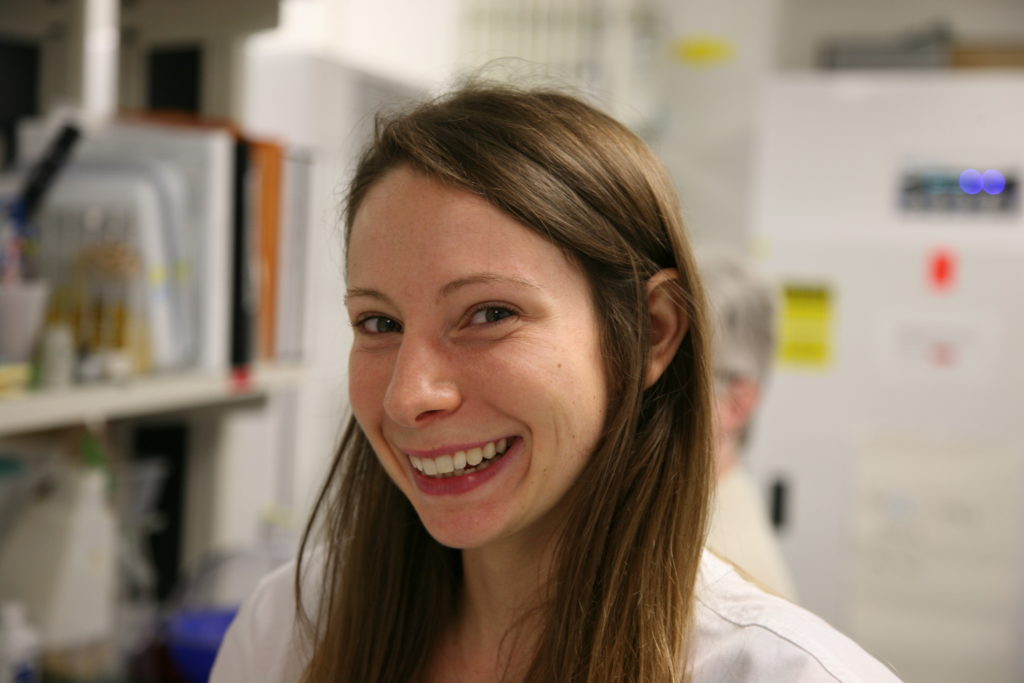
Kerri Miazowicz is a 3rd year Ph.D. trainee in Courtney Murdock‘s laboratory. She grew up in southern Michigan where she received a B.S. in microbiology from Michigan State University in 2012. After graduation, she spent more than two years as a Postbaccalaureate IRTA Fellow at the Rocky Mountain Laboratories, NIH/NIAID in Montana with the Virus Ecology Unit within the Laboratory of Virology.
Choosing the University of Georgia
Kerri chose the University of Georgia for her graduate training because she wanted to conduct interdisciplinary research related to disease ecology and vector-borne disease transmission.
“UGA hosts many experts across several scientific disciplines allowing me to link molecular biology and individual level phenotypes to population-level dynamics,” said Kerri. ” UGA is also home to the Center for Tropical and Emerging Global Diseases and the Center for Ecology of Infectious Diseases (CEID), which both provide valuable research resources and expertise.”
Research Focus
Kerri’s research focuses on environmental drivers of mosquito-borne disease transmission. Mainly, understanding how the environment affects the mosquito vector and modeling the consequences of these interactions on transmission dynamics.
“My current project revolves around temperature effects on Anopheles stephensi [the primary mosquito that transmits malaria in Asia] trait performance (longevity, biting frequency, and population growth), and mathematically exploring the implications these effects have on transmission.”
She will also investigate how Plasmodium, the parasite that causes malaria, exposure and infection modify these mosquito traits which are critical in transmission events.
“I find vector-borne diseases interesting due to the immense complexity that these systems contain,” said Kerri. “I also find it interesting to think about ‘scaling-up’ the outcome of molecular interactions and individual phenotypes to the context of population-level dynamics.”
Kerri has been able to conduct fieldwork within the Athens area to study how microclimate across an urban area can influence mosquito development along with adult mosquito traits with are important for mosquito-borne disease transmission.
“If I was able to travel for research purpose, it would be to India or Africa, where malaria is endemic, to study local mosquito populations.”
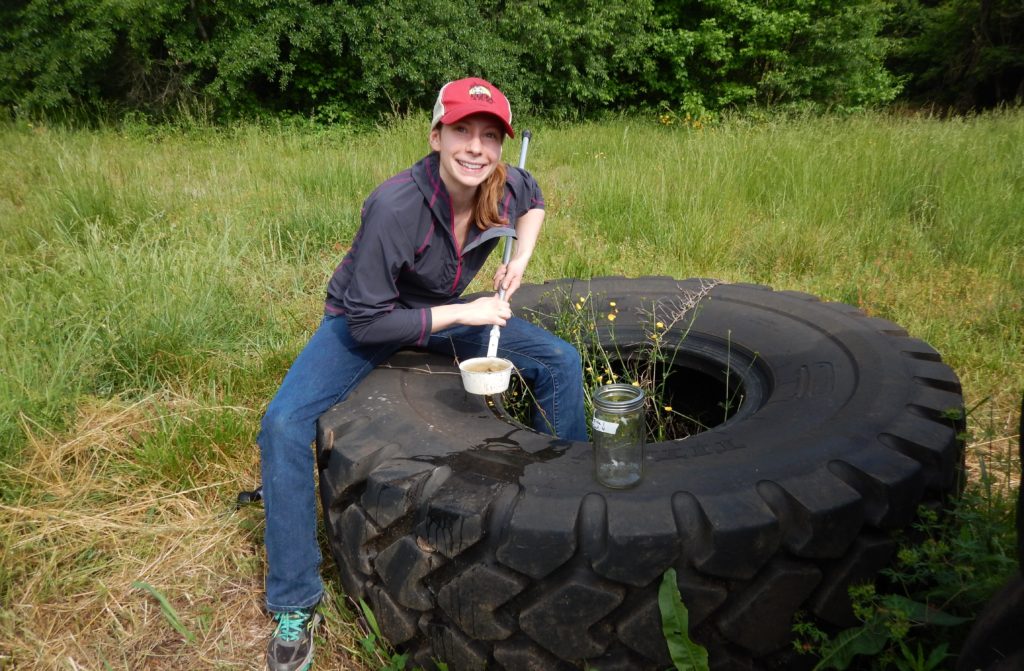
Trainee Earns Accolades
Kerri has received a number of awards recognizing her academic and research achievements. In 2009, she was named a 2008-2009 Regional Semifinalist for the Young Epidemiology Scholars (YES) Program. In 2010, Kerri was named a National Institutes of Health Undergraduate Scholar.
In 2014, she received an OITE Travel Award to attend the NIH Graduate and Professional School Fair, which allows NIH interns and postbacs to explore where the next step in their training will be.
Since coming to UGA, she has received an American Society of Virology Travel Award (2016) and a National Science Foundation Graduate Research Fellowship that funds 3 years of research training. In 2017, she received a travel award to attend the annual meeting of the Vector Behavior Ecology Research Coordination Network (VectorBITE RCN) at Imperial College in London.
What’s Next
While Kerri has a few more years of training at UGA, she hopes to continue conducting scientific research related to disease ecology and transmission dynamics in either an academic or government setting.
Your financial gift to CTEGD funds the Training Innovations in Parasitologic Studies (TIPS) Fellowships which allows trainees like Kerri Miazowicz to travel to international field sites for research. Give Today!
Trainee Spotlight: Beatrice Colon
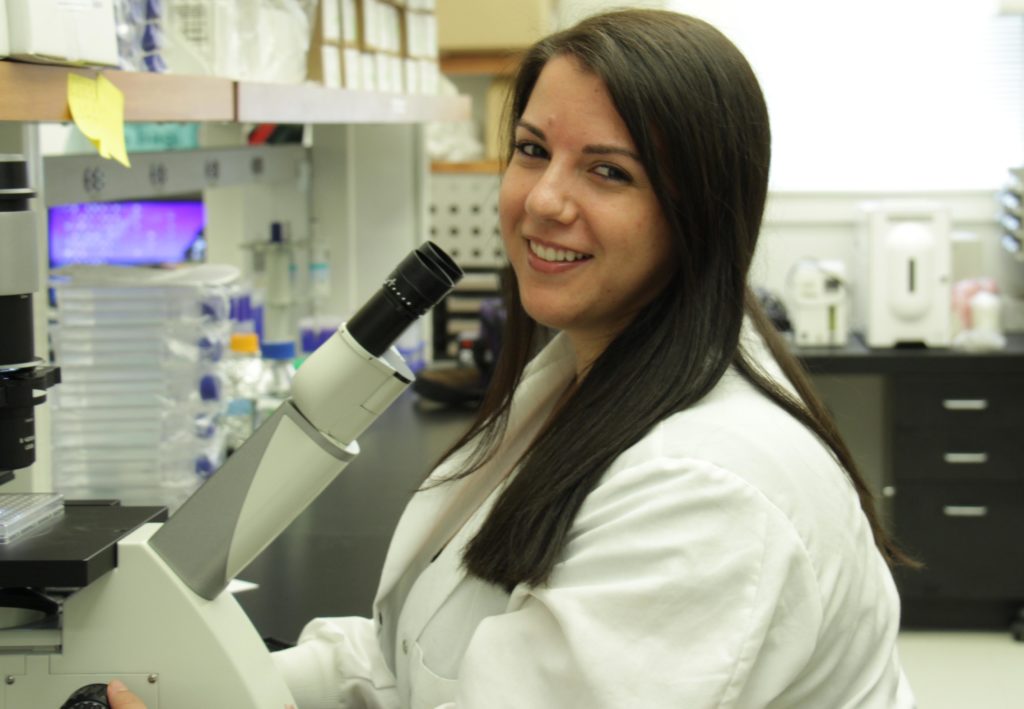
Beatrice Colon, an Illinois native, is a Ph.D. trainee in Dennis Kyle’s laboratory. She holds a Bachelor of Science degree from the University of Illinois at Urbana-Champaign and a Master of Science degree from the University of South Florida (USF). She began her Ph.D. at USF as well.
Beatrice moved to the University of Georgia in January 2017 with the Kyle Lab.
“I decided to transfer universities because of the excellent infectious disease department,” said Beatrice.
Research and Training
“My favorite thing about the CTEGD is the openness for collaborations; the center is also very focused on training a new generation of scientists. “
Beatrice is currently working on a drug discovery project for the brain-eating amoeba, Naegleria fowleri. The disease was the major factor that drew her to the project. Primary amoebic meningoencephalitis is nearly always fatal and affects young healthy children. Moreover, there is not an effective drug treatment for people that do get infected with the amoeba.
In her short time at UGA, Beatrice has won first place for a poster presentation at the graduate student and postdoc symposium. She was also selected for the Biology of Parasitism course at Woods Hole, MA this past summer.
“This course was definitely a career-changing experience – I was able to work with a variety of infectious diseases and learn techniques that were not available for the parasite I work on.”
What’s Next
Beatrice is interested in staying in drug discovery for infectious diseases and currently looking at positions in both academia and industry.
Support trainees like Beatrice Colon. Give TODAY!
UGA receives life sciences industry awards from Georgia Bio
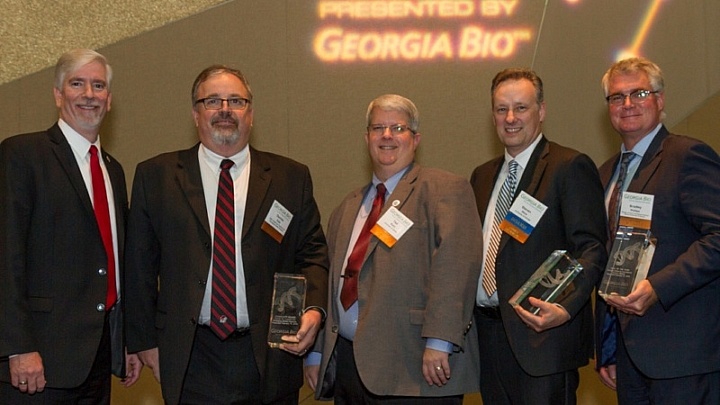
By Allyson Mann
The University of Georgia was well represented at the Georgia Bio Awards, with five awards recognizing programs either at or affiliated with the university. The awards were presented by Georgia Bio, the association for Georgia’s life sciences industry, at its 2018 annual awards dinner Feb. 15 in Atlanta.
This year, two UGA units—the Center for Vaccines and Immunology and the Center for Tropical & Emerging Global Diseases—received awards, as did ArunA Biomedical, a biotechnology company that grew out of faculty research. The university also is affiliated with two additional award winners, the Georgia Clinical & Translational Science Alliance and the National Science Foundation Engineering Research Center for Cell Manufacturing Technologies.
Georgia Bio members include pharmaceutical, biotechnology and medical device companies; medical centers; universities and research institutes; government groups; and other business organizations involved in the development of life sciences-related products and services.
“Improving human health and welfare is a vitally important part of UGA’s land-grant mission in the 21st century, and we have worked hard to expand our capabilities in this regard,” said UGA Vice President for Research David Lee. “It is gratifying to receive these awards from Georgia Bio, as they testify to the impact of our programs and the success of the faculty responsible for them.”
Ted M. Ross accepted the Phoenix Award, presented jointly to the Center for Vaccines and Immunology (CVI) and Sanofi Pasteur. Recipients of the Phoenix Award, sponsored by the Metro Atlanta Chamber and celebrating the best in industry and academic collaboration, have forged academic and industry relationships that drive translation and lead to new treatments and cures. Ross is Georgia Research Alliance Eminent Scholar of Infectious Disease and director of CVI, which is dedicated to improving human and animal health through new and improved vaccine technologies.
Two Deals of the Year Awards were presented in recognition of financial or commercial transactions that are significant to the development of Georgia’s life sciences industry. The first was awarded to the Georgia Clinical & Translational Science Alliance (Georgia CTSA), a team comprising UGA, Emory University, the Morehouse School of Medicine and the Georgia Institute of Technology that will train new investigators and develop the infrastructure for accelerating research-based improvements in clinical care and outcomes for the benefit of Georgia citizens. Bradley Phillips, the Millikan-Reeve Professor of Pharmacy and director of the Clinical and Translational Research Unit, is UGA’s principal investigator for Georgia CTSA, which received a $51 million National Institutes of Health statewide grant.
The second Deals of the Year Award was presented to the National Science Foundation Engineering Research Center for Cell Manufacturing Technologies (CMaT), which received a $20 million grant. CMaT is a federally funded consortium based at the Georgia Institute of Technology and designed to lower the cost and improve the reliability and safety of advanced cell therapies for chronic diseases like heart disease and cancer. The UGA lead for CMaT is Steven Stice, director of the Regenerative Bioscience Center, Georgia Research Alliance Eminent Scholar and D.W. Brooks Distinguished Professor in the College of Agricultural and Environmental Sciences.
Stice also accepted an Innovation Award for ArunA Biomedical, a biotechnology company he founded. ArunA Biomedical are experts in the design and scaling of a new class of cell-free biologic therapeutics and neural-specific drug delivery systems to treat central nervous system injury and neurodegenerative disorders. The Innovation Award honors those who are forging new ground by thinking outside traditional paradigms to create unique technology.
The Center for Tropical & Emerging Global Diseases received a Community Award, presented to those whose contributions to Georgia’s life sciences community are worthy of special recognition. Directed by Dennis Kyle, CTEGD is one of the largest international centers of research focused on diseases of poverty common to undeveloped and poor regions of the world. CTEGD researchers work on diseases that afflict hundreds of millions of people around the globe, including malaria, schistosomiasis, African sleeping sickness, Chagas disease, cryptosporidiosis, toxoplasmosis, leishmaniasis and filariasis.
Originally published at https://ugaresearch.uga.edu/uga-receives-life-sciences-industry-awards-from-georgia-bio/
Visiting Scholar: Elvis Ofori Ameyaw
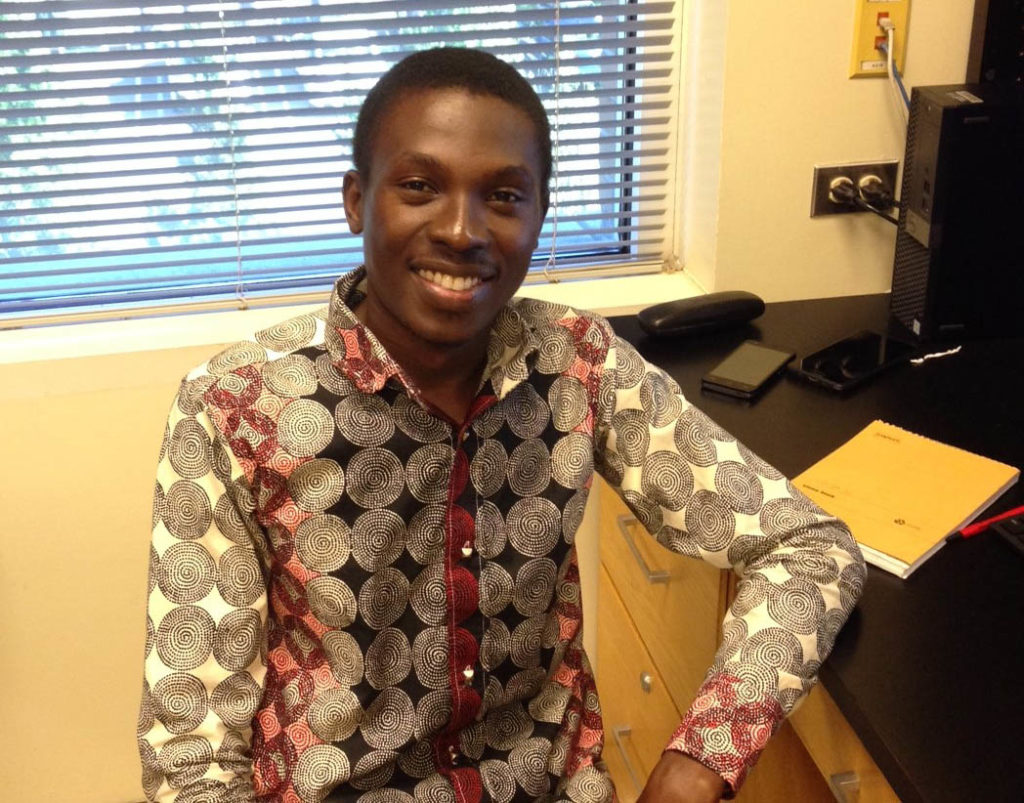
Elvis Ofori Ameyaw is a Fulbright Scholar visiting M. Belen Cassera‘s laboratory in the department of molecular biology and biochemistry. He is a senior lecturer, Head of the Department of Biomedical Sciences and the Vice-Dean of the School of Allied Health Sciences in the College of Health and Allied Sciences at the University of Cape Coast in Ghana.
Dr. Ameyaw holds a B. Pharm and Ph.D. in Pharmacology. His research focuses on natural product drug discovery for infectious, in particular, malaria and Leishmania, and inflammatory diseases. At the University of Georgia, he is using in vitro techniques to screen some natural products isolates from plants that are traditionally used to treat malaria in Ghana.
“UGA is globally known for excellent research and education and my host scientist, Prof. M. Belen Cassera has created an envious and reputable niche in natural product research,” said Dr. Ameyaw.
The availability of seminars and other opportunities to interact with leading scientists also factored into Dr. Ameyaw’s decision to come to UGA.
“The research staff at UGA are very supportive and willing to share ideas.” said Dr. Ameyaw.
Athens reminds him of the college town of Cape Coast where he resides and works in Ghana.
“The city makes me feel at home away from home.”
Read more about Dr. Cassera’s natural products research.
UGA Researcher Seeks to Unlock Secrets of Malaria Parasite
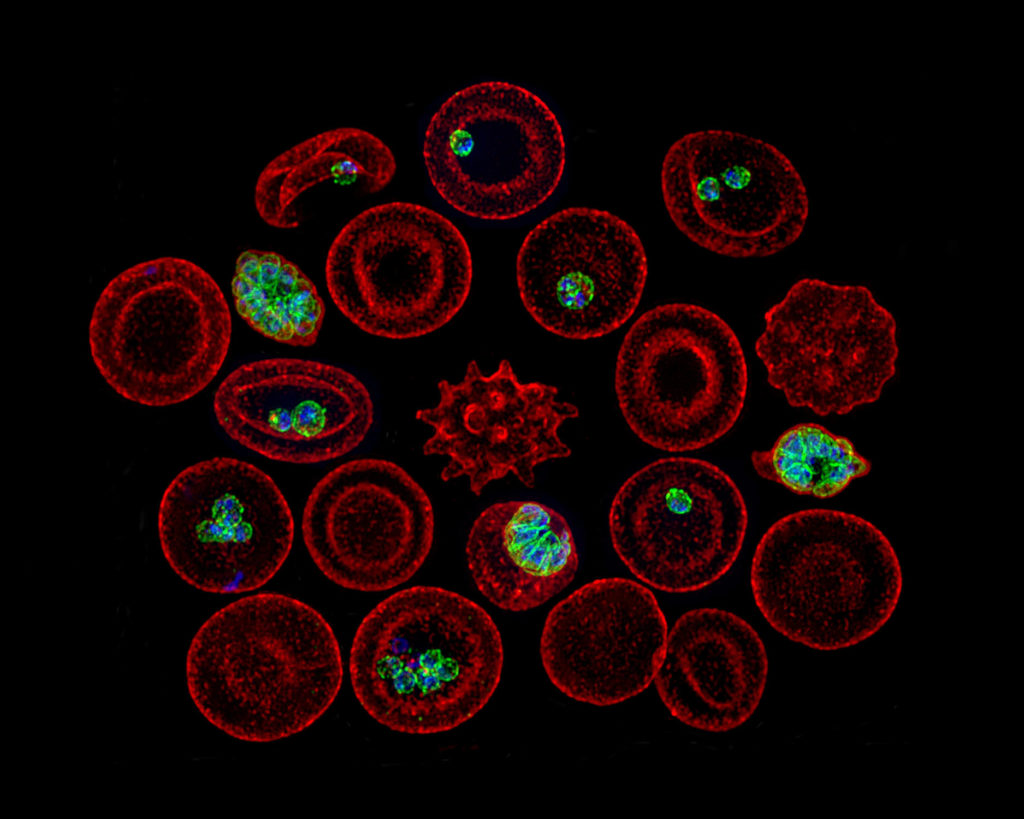
Vasant Muralidharan and his research team at the University of Georgia’s Center for Tropical and Emerging Global Diseases are making great strides in understanding how the malaria parasite hijacks red blood cells to cause disease but many of the parasite’s strategies remain elusive. A new $1.875 million grant from the National Institutes of Health will allow them to continue this research.
Malaria is a parasitic disease that infects nearly 220 million people and kills nearly half a million people every year. Almost all the deaths occur in young children and primarily in sub-Saharan Africa. The parasite Plasmodium falciparum invades human red blood cells which directly leads to malaria symptoms that include headaches, muscle pain, periodic fevers with shivering, severe anemia, trouble breathing, and kidney failure. The parasite can also cause the most severe forms of malaria, such as cerebral malaria which can lead to brain damage, coma and death, and placental malaria, which occurs in pregnancy and can be life-threatening to both the mother and fetus.
Complete control of the infected red blood cell is required for parasites to grow and spread. The malaria parasite remodels the host cell by exporting hundreds of parasite proteins across numerous membranes that transform all aspects of infected red blood cells to suit its needs. The export of these proteins by P. falciparum to the host red blood cells is a unique parasite-driven process that is associated with many of the clinical manifestations of malaria, including death. The mechanisms which these proteins are exported are unknown.
“Exported proteins, many of them absolutely essential for the growth of the parasite, are recognized and sorted throughout the trafficking process by dedicated machinery that we have only now begun to understand,” said Muralidharan, assistant professor in the department of cellular biology.
His lab hopes to reveal unique protein trafficking mechanisms of P. falciparum that may be targets for antimalarial drug development.
“We expect that this project will significantly advance our understanding of the protein export pathway in P. falciparum and how key decisions are made within the parasite that usher exported proteins to their site of action in the infected red blood cells,” concluded Muralidharan.
National Institutes of Health Award R01 AI130139 “Elucidating the trafficking mechanisms of effector proteins to the Plasmodium infected red blood cell.”

